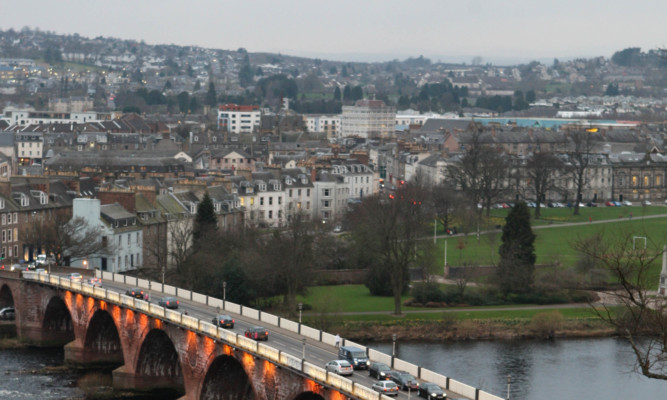A major new effort to remove dangerous levels of pollution from the streets of Perth is to be made by council chiefs.
For years the air in parts of the city has been so laced with toxic carcinogens it has been labelled a health hotspot.
The unenviable distinction has proved impossible to shake off, with the main cause being the continuing congestion on main routes.
A number of potential solutions have failed to get off the ground, while minor fixes such as changing the schedule of traffic lights can only make so much difference.
Now, however, Perth and Kinross Council is making a second bid to create a transport hub in a bid to remove hundreds of heavy goods vehicles from the streets.
The plan has faltered in the past due to an inability to find an operator willing to run the scheme but the local authority believes the idea is the key to tackling the city’s air pollution.
A similar scheme has had a positive impact on nine cities in the Netherlands and the people behind that success are now visiting Scotland to pass on their expertise.
A renewed bid has been launched by the council and Tactran, a gathering of Perth and Kinross councillors along with colleagues from other councils who work on transport issues, to find a firm capable and willing to operate the freight consolidation centre.
Interested parties will be invited to explore the proposal at an evening meeting in Perth next month.
Perth’s problems with air quality stem from the presence of a number of traffic bottlenecks, including Barrack Street, Tay Street, Dundee Road, the Queen’s Bridge and Bridgend.
Worst affected is the junction of Atholl Street, Melville Street and North Methven Street, with Atholl Street one of the country’s 12 most polluted streets.
A business event will be held in the Adam/McDonald Room at the Salutation Hotel in Perth’s South Street on Thursday October 9, beginning at 6pm.
It seems likely an existing logistics operator would take on such a scheme but Tactran does not rule out someone entirely new to the business.
“The Dutch partners who started the Binnenstadservice which now operates successfully in nine cities were not involved in logistics,” said Tactran’s Michael Cairns.
“Max Prudon worked in the chemical industry and Birgit Hendriks was a city centre manager but both had an interest in improving the environment.
“They operate the company successfully as a social enterprise.”
Mr Cairns said he believed a similar scheme in Perth could make a “huge difference” to air pollution and congestion.
Due to the high levels of nitrogen dioxide (N02) and particulates in the air, the city centre has been designated an air quality management area since 2006.
Though the levels are unlikely to immediately harmful to residents, over time, breathing in raised levels of N02 can lead to an increased likelihood of respiratory problems.
It inflames the lining of the lungs and can reduce immunity to lung infections, causing problems such as wheezing, coughing, colds, flu and bronchitis.
Such health risks are one of the main reasons the council is so determined to make the freight scheme proposed for the Inveralmond Industrial Estate a reality.
A logistics service centre would provide a range of services to businesses in Perth including consolidation of deliveries on to fewer, better loaded delivery vehicles, storage and warehousing and the collection of returned goods and recyclable materials.
Importantly, that could halve the number of delivery vehicles entering the city centre.
With a large proportion of the nitrogen dioxide in Scotland’s towns and cities coming from motor vehicle exhausts, that could have a huge impact upon air quality.
Any business interested in attending the October event is asked to confirm by emailing MichaelCairns@tactran.gov.uk.
